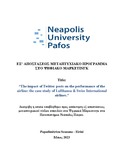| dc.contributor.advisor | Saprikis, Evangelos | |
| dc.contributor.author | Papadimitriou, Souzana - Eirini | |
| dc.date.accessioned | 2023-07-24T09:03:21Z | |
| dc.date.available | 2023-07-24T09:03:21Z | |
| dc.date.issued | 2023-05 | |
| dc.identifier.uri | http://hdl.handle.net/11728/12489 | |
| dc.description | ENGLISH ABSTRACT: With the increasing importance of social media and online presence in digital marketing strategies, consumers of products and services have realized the power given to them by social media and online reviews. For this reason, it is in the great interest of companies to be able to quantify how specific reviews and their frequency can affect their business, and thus adjust their incident management strategies, and invent new methods of approaching dissatisfied customers. This study aims to examine how passengers can influence an airline’s performance through their online behavior and feedback, propagated via social media and specifically Twitter. The collected data were categorized based on their sentiment (positive, negative or neutral) using the sentence-level sentiment analysis method and determined their polarity score. Moreover, the temporal relationship for both airlines was studied in combination with the Pearson correlation metric, which was classified as “negligible association”. In order to confirm the Pearson correlation findings, an attempt was made to fit a linear regression model and the 𝑅 2 scores to the data. The final conclusion was that for both companies the linear regression model had no explanatory power over the relationship of the dimension under study. In both companies, the resulting lines have considerable distance from most of the data points of the sample, while the 𝑅 2 metric score hints that the polarity metric cannot explain a significant part of the revenue’s variance. | en_UK |
| dc.description.abstract | Με την ολοένα αυξανόμενη σημαντικότητα των μέσων κοινωνικής δικτύωσης και την διαδικτυακή παρουσία στις στρατηγικές ψηφιακού μάρκετινγκ,οι καταναλωτές προϊόντων και υπηρεσιών έχουν συνειδητοποιήσει τη δύναμη που τους δίνουν τα μέσα κοινωνικής δικτύωσης και οι διαδικτυακές κριτικές. Για το λόγο αυτό, είναι προς το μεγάλο συμφέρον των επιχειρήσεων να μπορούν να ποσοτικοποιήσουν τον τρόπο με τον οποίο συγκεκριμένες κριτικές και η συχνότητά τους μπορούν να επηρεάσουν την επιχείρησή τους, και έτσι να προσαρμόσουν τις στρατηγικές διαχείρισης των περιστατικών τους και να εφεύρουν νέες μεθόδους προσέγγισης δυσαρεστημένων πελατών. Η παρούσα μελέτη έχει ως στόχο να εξετάσει τον τρόπο με τον οποίο οι επιβάτες μπορούν να επηρεάσουν την απόδοση μιας αεροπορικής εταιρείας μέσω της διαδικτυακής τους συμπεριφοράς και των σχολίων τους, που διαδίδονται μέσω των μέσων κοινωνικής δικτύωσης και συγκεκριμένα του Twitter. Τα δεδομένα που συλλέχθηκαν κατηγοριοποιήθηκαν με βάση το συναίσθημά τους (θετικό, αρνητικό ή ουδέτερο) χρησιμοποιώντας τη μέθοδο ανάλυσης συναισθήματος σε επίπεδο πρότασης και προσδιορίστηκε το polarity score τους. Επιπλέον, μελετήθηκε η χρονική σχέση για τις δύο αεροπορικές εταιρείες σε συνδυασμό με τη μετρική συσχέτισης Pearson, η οποία χαρακτηρίστηκε ως "αμελητέα συσχέτιση". Προκειμένου να επιβεβαιωθούν τα ευρήματα της συσχέτισης Pearson, επιχειρήθηκε η προσαρμογή ενός μοντέλου γραμμικής παλινδρόμησης και των μετρικών 𝑅 2 στα δεδομένα. Το τελικό συμπέρασμα ήταν ότι και για τις δύο εταιρείες το μοντέλο γραμμικής παλινδρόμησης δεν είχε καμία επεξηγηματική δύναμη πάνω στη σχέση της διάστασης υπό μελέτη. Και στις δύο εταιρείες, οι γραμμές που προκύπτουν έχουν σημαντική απόσταση από τα περισσότερα σημεία δεδομένων του δείγματος, ενώ η βαθμολογία της μετρικής 𝑅 2 υποδηλώνει ότι το polarity score δεν μπορεί να εξηγήσει σημαντικό μέρος της διακύμανσης των εσόδων. | en_UK |
| dc.language.iso | en | en_UK |
| dc.publisher | Μεταπτυχιακό Πρόγραμμα Ψηφιακό Μάρκετινγκ, Σχολή Οικονομικών Επιστημών και Διοίκησης, Πανεπιστήμιο Νεάπολις Πάφου | en_UK |
| dc.subject | social media | en_UK |
| dc.subject | Twitter | en_UK |
| dc.subject | customers | en_UK |
| dc.subject | sentiment analysis | en_UK |
| dc.subject | polarity score | en_UK |
| dc.subject | Pearson correlation | en_UK |
| dc.subject | linear regression | en_UK |
| dc.subject | Μέσα κοινωνικής δικτύωσης | en_UK |
| dc.subject | καταναλωτές | en_UK |
| dc.subject | ανάλυση συναισθήματος | en_UK |
| dc.subject | συσχέτιση Pearson | en_UK |
| dc.subject | γραμμική παλινδρόμηση | en_UK |
| dc.title | The impact of Twitter posts on the performance of the airline: the case study of Lufthansa & Swiss International airlines. | en_UK |
| dc.title.alternative | Διατριβη η οποία υποβλήθηκε προς απόκτηση εξ αποστάσεως μεταπτυχιακού τίτλου σπουδών στο Ψηφιακό Μάρκετινγκ στο Πανεπιστήμιο Νεάπολις Πάφου. | en_UK |


